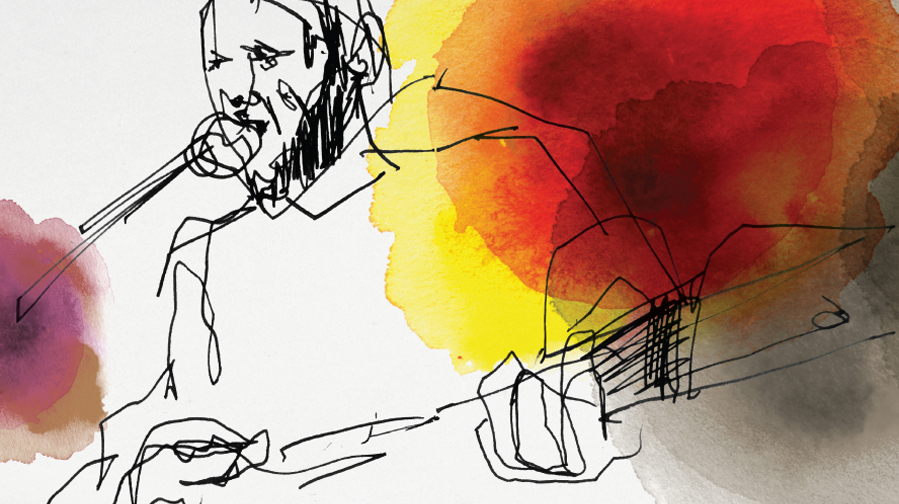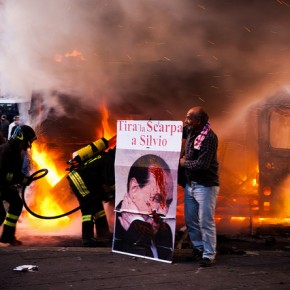To wear armor at all is to need protection, to fear wounds beyond what the body can sustain. So when that armor begins to fail, the resulting vulnerability is so much worse than an unguarded safety. On his sixth album under the Crooked Fingers name, Eric Bachmann takes a songwriting trip into a state of such startling vulnerability that it’s hard to count all the wounds contained in its 11 songs. Its title Breaks In The Armor points not only to flaws, but also to those mechanisms people use to stay guarded.
Bachmann – a songwriter of three voices – has spent most of 2011 with the revival of his seminal indie band Archers of Loaf. While their pop never sounded safe in the 1990s, returning to it now provides the comfort of the familiar. Not to mention that the passage of time has distanced him from the feelings it channels.
Breaks in the Armor, by contrast, finds Bachmann grappling with the present. With just Liz Durrett on backing vocals, this sparse album could certainly be considered a solo record, like his 2006 Saddle Creek release To the Races. That he instead chose the Crooked Fingers moniker, with which his post-Archers career is most closely associated, possibly indicates that he wished to accentuate its “broken” aspect.
There isn’t much room to hide. The core elements of guitar, bass, drums and vocals are only partially and occasionally adorned with anything more. This sense of space is echoed in the cover art, which features a crude pen sketch of Bachmann playing guitar and singing, its harsh scraggly lines broken and incomplete. Dabs of watercolor – mostly dark – encroach, but lend little in the way of beauty.
Recording in Athens, Georgia with the Pixies’ sound engineer Matt Yelton, Bachmann’s restlessness comes to the fore on Breaks In The Armor’s simpler arrangements. It’s an intense experience, particularly once his lyrics begin to settle into more recognizable shapes after a few listens.
“Typhoon” opens with insistent, thumping toms as Bachmann sings about the ghosts of his forgotten past, ghosts that turn the past into a storm that flares up occasionally. The never-ending clash between the present and past is a theme spread across the whole album. What Bachmann seems to suggest again and again is that there’s an inherent disconnect between memory and reality, one that prevents people from knowing precisely what went wrong. To mix and twist clichés: time may heal all wounds, but history never remembers.
“Bad Blood” features a lurching beat and harsh guitar lines. It’s a song about damage and distance, with questions about an ill wind thrown to some fortune teller who’ll never be able to provide a clear enough warning. That song fades to “The Hatchet” by way of a spooky sort of radio crackle – the best example of the album’s masterful sequencing and flow. Bachmann sings of lovers who “coldly pretend” to each other in hopes they can bury the hatchet, free of loose ends.
Next is “The Counterfeiter,” the closest track to the soaring, up-tempo anthems that anchored the Crooked Fingers’ last two records, Dignity and Shame and Forfeit/Fortune. But still, it’s a cold-blooded heart that has caught Bachmann’s attention.
“Black Candles,” with its repeated coda of “black candles burning in the kerosene rain,” is the most arresting song on the album. “Went to the City” makes the most of a bleak, mournful chorus: “You come and go alone / You don’t stand a chance.”
“Your Apocalypse” and “She Tows The Line” deal with the notion that wounds are inevitable because people don’t always – indeed, don’t often – measure up to the obstacles they face. “War Horses” has Bachmann writing with a flair for the epic – whether its war fiction or fantasy – with closely drawn battle imagery (including the album’s title phrase): “bracing for all hell, for the sentry to shoot us down.”
Breaks In The Armor is an intensely personal record that unfolds atop a harsh and treacherous landscape. It’s shot through with a sense of exiled solitude, as if a man isn’t even allowed the passage necessary to begin his search for peace. The landscape Bachmann conjures here is one of subtly shifting dangers, with the ghosts of personal doubts and failures close and prevalent enough to take the shape of a maze.
Bachmann lyrics, often written as dialogue, have never been so blunt, so direct. These are words stretched thin for people who’ve been stretched thin. And they point to a hard-won understanding: life’s struggles are surmountable, but at a serious cost. These are the type of thoughts that startle a person awake, with an uneasy and inexplicable fear creeping across the dark spaces in the room.
But Breaks In The Armor is ultimately an album, not of pessimism, but of wariness, of realistic expectations of pitfalls, the weary knowledge that walls will crumble, beauty will fade and lovers are far more likely to abandon each other than remain intertwined forever. And that even though sometimes trying hard enough simply isn’t possible, there’s still a chance at finding a steady place to weather the storms.
The fact is, life is always incomplete. It’s incomplete for the wealthy as well as the poor, the happy as well as the miserable. It’s certainly incomplete at birth and though it may require a lack of faith to say so, life is undoubtedly incomplete at death.
Breaks In The Armor doesn’t point toward beauty, doesn’t dwell on any such distractions. The message may be bleak, but Bachmann here is making a point as fundamental as any: life is about survival, about withstanding the elements, internal, interpersonal as well as external.
Breaks In The Armor is about pressing on, about the strength and inherent nobility of simply persevering.




